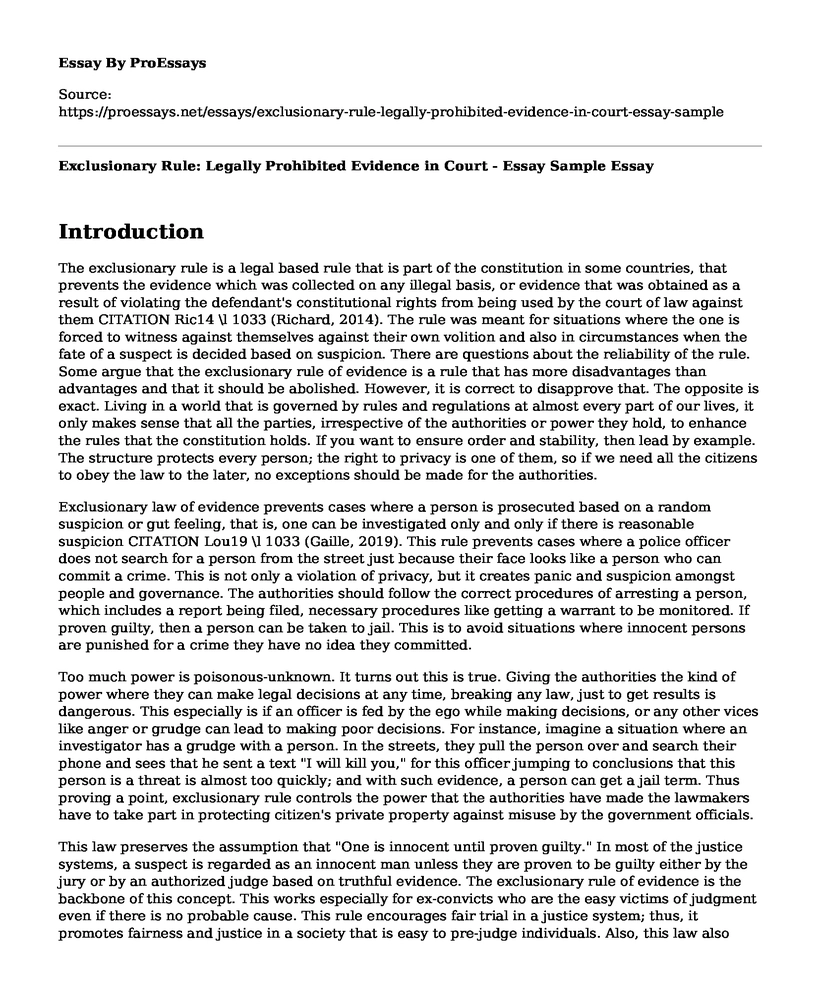Introduction
The exclusionary rule is a legal based rule that is part of the constitution in some countries, that prevents the evidence which was collected on any illegal basis, or evidence that was obtained as a result of violating the defendant's constitutional rights from being used by the court of law against them CITATION Ric14 \l 1033 (Richard, 2014). The rule was meant for situations where the one is forced to witness against themselves against their own volition and also in circumstances when the fate of a suspect is decided based on suspicion. There are questions about the reliability of the rule. Some argue that the exclusionary rule of evidence is a rule that has more disadvantages than advantages and that it should be abolished. However, it is correct to disapprove that. The opposite is exact. Living in a world that is governed by rules and regulations at almost every part of our lives, it only makes sense that all the parties, irrespective of the authorities or power they hold, to enhance the rules that the constitution holds. If you want to ensure order and stability, then lead by example. The structure protects every person; the right to privacy is one of them, so if we need all the citizens to obey the law to the later, no exceptions should be made for the authorities.
Exclusionary law of evidence prevents cases where a person is prosecuted based on a random suspicion or gut feeling, that is, one can be investigated only and only if there is reasonable suspicion CITATION Lou19 \l 1033 (Gaille, 2019). This rule prevents cases where a police officer does not search for a person from the street just because their face looks like a person who can commit a crime. This is not only a violation of privacy, but it creates panic and suspicion amongst people and governance. The authorities should follow the correct procedures of arresting a person, which includes a report being filed, necessary procedures like getting a warrant to be monitored. If proven guilty, then a person can be taken to jail. This is to avoid situations where innocent persons are punished for a crime they have no idea they committed.
Too much power is poisonous-unknown. It turns out this is true. Giving the authorities the kind of power where they can make legal decisions at any time, breaking any law, just to get results is dangerous. This especially is if an officer is fed by the ego while making decisions, or any other vices like anger or grudge can lead to making poor decisions. For instance, imagine a situation where an investigator has a grudge with a person. In the streets, they pull the person over and search their phone and sees that he sent a text "I will kill you," for this officer jumping to conclusions that this person is a threat is almost too quickly; and with such evidence, a person can get a jail term. Thus proving a point, exclusionary rule controls the power that the authorities have made the lawmakers have to take part in protecting citizen's private property against misuse by the government officials.
This law preserves the assumption that "One is innocent until proven guilty." In most of the justice systems, a suspect is regarded as an innocent man unless they are proven to be guilty either by the jury or by an authorized judge based on truthful evidence. The exclusionary rule of evidence is the backbone of this concept. This works especially for ex-convicts who are the easy victims of judgment even if there is no probable cause. This rule encourages fair trial in a justice system; thus, it promotes fairness and justice in a society that is easy to pre-judge individuals. Also, this law also reduces the risks of planting and even manufacturing evidence. This rule emphasizes that there ought to be a documented chain of evidence for a prospected crime against an individual for that evidence to be taken to court. By having this rule, it exempts such kind of evidence to be even considered in making a ruling. In conclusion, exclusionary application rule in the modern-day justice system should not be abolished; on the contrary, it should be enforced by every governance system.
References
Gaille, L. (2019). Exclusionary rule pros and cons.
Richard, R. (2014). The due process exclusionary rule.
Cite this page
Exclusionary Rule: Legally Prohibited Evidence in Court - Essay Sample. (2023, May 28). Retrieved from https://proessays.net/essays/exclusionary-rule-legally-prohibited-evidence-in-court-essay-sample
If you are the original author of this essay and no longer wish to have it published on the ProEssays website, please click below to request its removal:
- Seneca Falls: Women's Rights Convention Essay
- Punishment for Steve Chapman Essay Example
- Essay Example on Trial vs Appellate Courts: 3 Significant Differences
- Terrorism in America: The US Criminal Code Title 18 Part 1 Chapter 113B - Essay Sample
- Couple's $1.2M Jewelry Stolen From Hotel Safe: Who Pays? - Case Study
- Essay Example on Death Penalty as a Deterrent to Crime
- Essay Example on Combining Law and Forensic Science: A New Path to Justice







